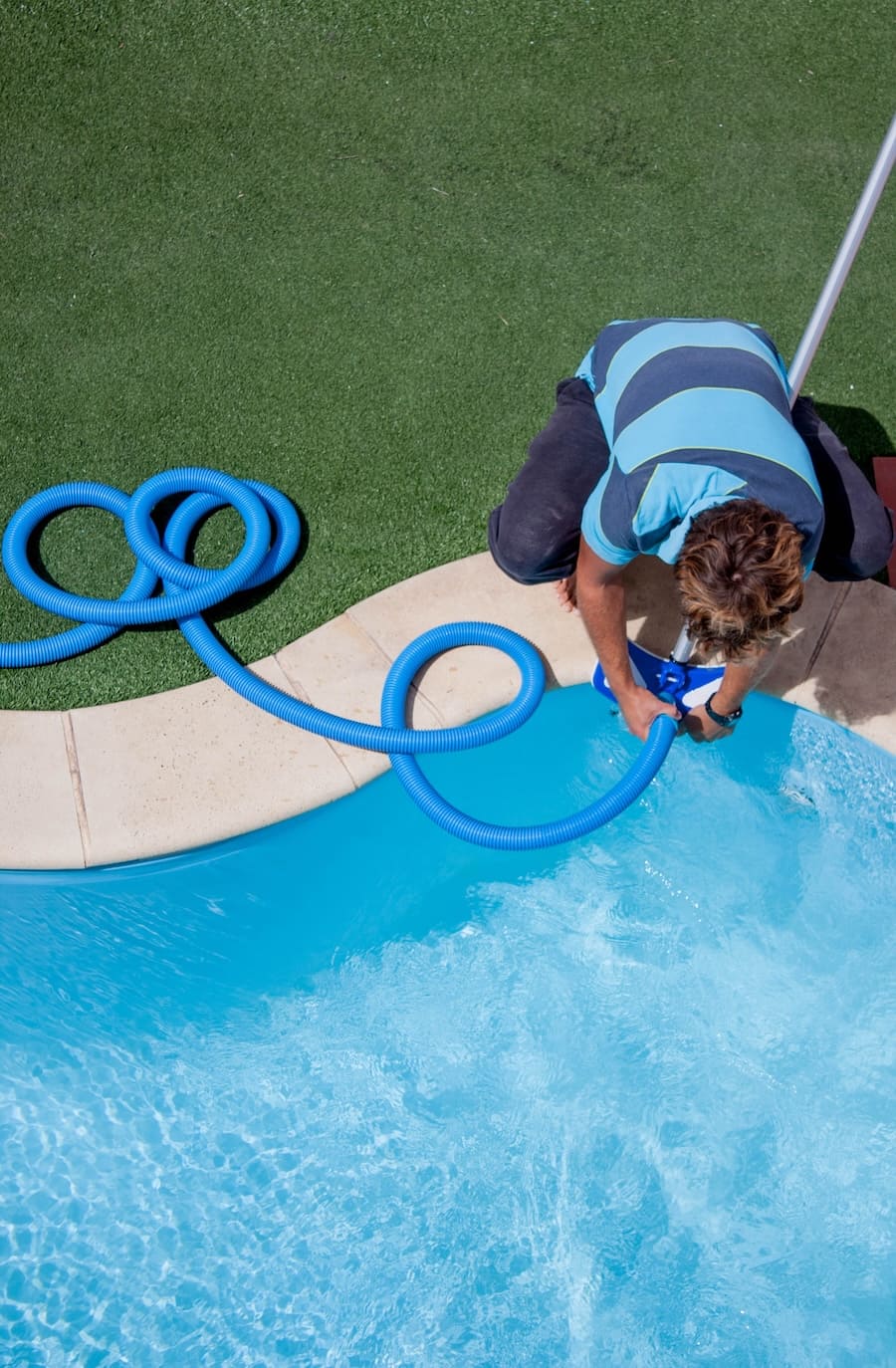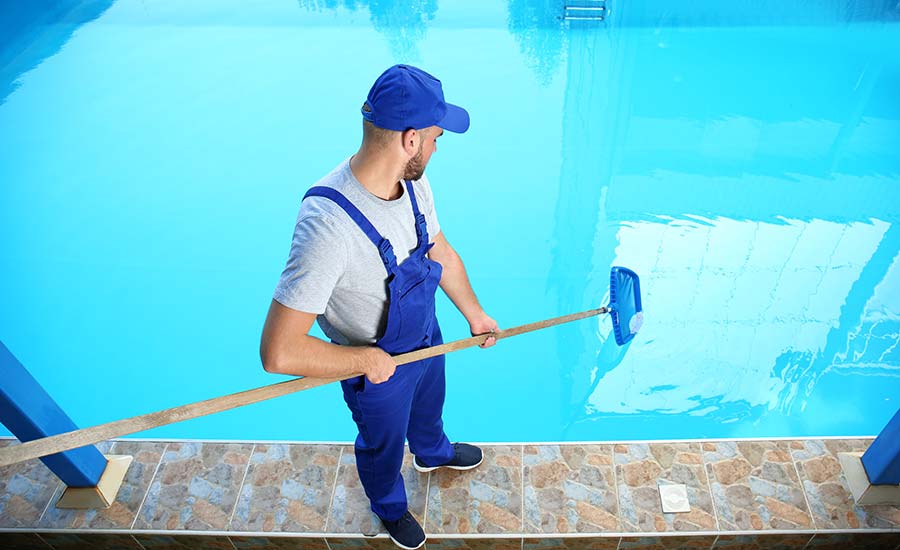Reliable Pool Repair Solutions to Restore Your Pool’s Functionality
Reliable Pool Repair Solutions to Restore Your Pool’s Functionality
Blog Article
Necessary Pool Maintenance Tips to Maintain Your Water Sparkling Clean
Maintaining a pristine swimming pool requires a systematic method to water care and sanitation, which eventually contributes to both the aesthetic allure and long life of the swimming pool itself. Adhering to these essential methods not just enhances the quality of your swimming pool water yet also safeguards against prospective issues that could escalate into costly fixings.
Examination Water Chemistry Consistently
To make certain a pleasurable and secure swimming experience, frequently checking water chemistry is necessary. Proper water balance not only enhances swimmer convenience however also shields swimming pool equipment and surfaces. The main chemical specifications to keep an eye on consist of pH, chlorine levels, alkalinity, and calcium hardness.
pH degrees must be preserved in between 7.2 and 7.8, as this array lessens skin and eye inflammation while enhancing chlorine effectiveness. Chlorine degrees must ideally be between 1-3 parts per million (ppm) to provide adequate cleanliness without triggering undesirable smells or irritation. Complete alkalinity, which acts as a barrier for pH, should be kept between 80-120 ppm to support water chemistry and protect against changes.

Maintain the Swimming Pool Filter Clean
Keeping proper water chemistry is just component of effective swimming pool treatment; maintaining the pool filter tidy is just as important for optimum performance. The swimming pool filter plays an important role in getting rid of debris, dust, and pollutants from the water, guaranteeing a safe and enjoyable swimming atmosphere. In time, filters can become blocked with fragments, which can dramatically lower their effectiveness.

Furthermore, monitor the stress gauge on your filter system. A pressure rise of 8-10 psi over the typical operating variety normally suggests that it's time for cleaning. Neglecting to keep a tidy filter can bring about poor water flow, unbalanced chemistry, and raised stress on the swimming pool pump, inevitably leading to higher energy expenses and possible equipment failure.
Skim and Brush Often

Combing the pool walls and floor is similarly crucial. Use a swimming pool brush with a suitable bristle type for your swimming pool surface area-- nylon brushes for plastic or fiberglass swimming pools, and stainless steel for plaster or tile surfaces.
Maintain Appropriate Water Levels
Keeping the pool surface tidy with frequent skimming and cleaning substantially contributes to overall water top quality, yet keeping appropriate water degrees is similarly crucial for ideal swimming pool health. The water degree in your swimming pool need to ideally be at the midpoint of the skimmer opening. This ensures that your skimmer can properly eliminate particles and floating impurities, protecting against accumulation that can compromise water clearness and high quality.
Low tide levels can cause pump damage, as the pump may run dry, running the risk of pricey Pool Repair repair services. Conversely, exceedingly high water degrees can cause water to overflow, thinning down chemical equilibriums and creating an unpleasant mess. Frequently examine your swimming pool's water level, specifically after hefty rainfall or substantial dissipation because of warm.
In enhancement, consider factors such as pool usage, ecological conditions, and the type of water attributes in your swimming pool, as these can influence water degrees. Installing a swimming pool cover can help lower dissipation and preserve a stable level if you locate yourself continually fighting ever-changing water levels. Ultimately, routine tracking and change of water degrees will help make sure a healthy and balanced swimming environment and prolong the life of your swimming pool tools.
Arrange Seasonal Maintenance
Recognizing the relevance of seasonal upkeep is essential for guaranteeing your pool stays in ideal condition year-round. Each season brings unique challenges and conditions that can influence the water quality and architectural honesty of your swimming pool. By scheduling upkeep jobs regularly, you can prevent small problems from escalating right into expensive repair services.
In the spring, focus on opening up the pool, checking the filtering system, and balancing the chemical degrees. This sets a solid foundation for the swimming period - Pool Inspection. As summer season strategies, regular maintenance such as skimming particles, brushing surface areas, and monitoring water degrees ends up being necessary to keep sanitation and safety and security
As loss gets here, prepare for cooler temperatures by removing fallen leaves and particles, and consider winterizing your swimming pool if it will not be used during the cooler months. This includes lowering water levels and adding winterizing chemicals to protect against cold.
During the wintertime, routine examine the pool cover and equipment are very important to make sure whatever continues to be undamaged. By adhering to a seasonal maintenance schedule, you can extend the life of your swimming pool and keep it inviting and risk-free for use year-round.
Conclusion
Routine swimming pool maintenance is important for guaranteeing water clarity and security. By consistently checking water chemistry, maintaining the pool filter in ideal condition, and executing routine skimming and brushing, pool owners can properly prevent algae growth and various other problems. Preserving proper water levels improves flow, while adhering to a seasonal maintenance timetable helps resolve prospective troubles proactively. Implementing these necessary practices will contribute dramatically to a tidy and inviting swimming environment.
By preserving appropriate water chemistry, swimming pool owners can guarantee a secure setting, lengthen tools life, and boost total enjoyment of their swimming pool.
Keeping correct water chemistry is just component of reliable pool treatment; maintaining the swimming pool filter clean is similarly essential for optimum efficiency. Use a swimming pool brush with an ideal bristle type for your pool surface-- nylon brushes for vinyl or fiberglass swimming pools, and stainless steel for plaster or tile surfaces.
Maintaining the pool surface area clean with regular skimming and brushing considerably adds to total water quality, however keeping appropriate water levels is just as important for ideal swimming pool wellness.In addition, think about elements such as pool use, environmental problems, and the kind of water functions in your swimming pool, as these can influence water levels.
Report this page